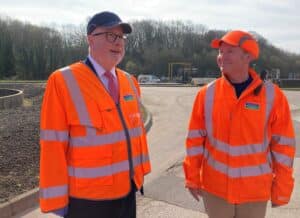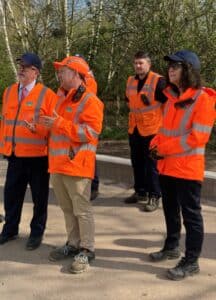MEMBER PRESS RELEASE - Northumbrian Water Selects Blackline Safety to Safeguard Workers, Identify Risks Two…
MP visits Mansfield Sewage Treatment Works, Notts, operated by Severn Trent
MP visits Mansfield Sewage Treatment Works, Notts, operated by Severn Trent
- Steve Yemm, MP for Mansfield visited the local Sewage Treatment Works (STW) in Nottinghamshire, operated by Severn Trent, to see the contribution it is making to local energy and waste recycling needs.
- Mansfield Sewage Treatment Works has been in operation since 1912 and supports over 100,000 people in Mansfield and the surrounding areas. The anaerobic digestion (AD) section of the site, which has been running since the 1960s, produces enough energy to operate the equipment on site at Mansfield STW.
On 4 April 2025, the local MP for Mansfield, Steve Yemm, visited the Mansfield Sewage Treatment Works operated by Severn Trent.
Following the visit, Mr Yemm, said: “It’s great to see Mansfield doing its bit in the national mission to make Britain a clean energy superpower. Local innovation like this shows we’ve got the ideas and drive right here in our town. I’ll be raising these efforts – particularly the potential of biogas production and utilisation – with the Department for Energy Security and Net Zero, to make sure they get the backing they need from Government to grow, thrive, and play an even bigger role in powering our country’s future.”
Leah Fry, Head of Bioresources at Severn Trent said: “It was great to welcome Mr Yemm to Mansfield and show him the work we’re doing at a lot of our sewage treatment works across the Severn Trent region. As a company we’re constantly looking for innovative ways to reduce our environmental impact and the energy we’re producing through bioresources means we’re powering a lot of our own sewage treatment works through our anaerobic digestion process.”
Mr Yemm was joined on this visit by representatives from the Anaerobic Digestion and Bioresources Association (ADBA), the UK trade body currently campaigning for government to make changes to key policies to help grow the sector and help it play its part in the UK’s Net Zero Transition.
Dr Gareth Mottram, Policy Lead at ADBA, said: “Biogas is a key pillar of renewable energy, providing a consistent and reliable source of power throughout the year, regardless of weather conditions which impact other renewables. With the right policies in place, anaerobic digestion (AD) can support the government in achieving its net zero and levelling up goals. Not only does AD play a crucial role in cutting greenhouse gas emissions, but it also helps reduce household energy bills and creates green jobs across the country.
Biogas is low regret solution that the government must support to ensure we turn organic waste into a valuable resource for powering homes, businesses, and the wider economy.”
ADBA has recently published a report indicating that the use of biogas could cut the cost of meeting Britain’s net zero targets in 2050 by nearly £300 billion against official projections. These findings are the result of new analysis by BMA, drawing on the computer model used by Whitehall.
-ENDS-
For further information, contact:
At Severn Trent:
Sam Davidson, Press Officer
E: sam.davison@severntrent.co.uk
At ADBA:
Alasdair Rogers, Communications Manager
e: alasdair.rogers @adbioresources.org; tel: +44 (0)20 8434 5407
Notes to editors:
- Photos + captions:

Steve Yemm MP (left) with Team Manager for Mansfield STW Jonathan Kendall 
Steve Yemm MP (left) being shown the bioresources section of Mansfield STW - About Severn Trent
Severn Trent is the UK’s second biggest water company. It serves 4.8m homes and business customers in England and Wales. Its region stretches from mid-Wales to Rutland and from north and mid-Wales south to the Bristol Channel and east to the Humber. The company delivers almost two billion litres of water every day through 50,000km of pipes. A further 93,000km of sewer pipes take waste water away to more than 1,000 sewage treatment works. www.severntrent.co.uk - About ADBA
The Anaerobic Digestion and Bioresources Association(ADBA) is the trade association for the UK anaerobic digestion (AD) and biogas industry. ADBA’s vision is to see the full potential of the UK AD industry realised so it can help the UK achieve its emissions targets and other policy goals, creating a truly circular economy. adbioresources.org - About the AD industry
- There are currently 756 AD plants operational in the UK
- The entire industry digests approximately 36 million tonnes of organic waste each year – organic material that would otherwise emit greenhouse gases including highly potent methane, if left untreated in landfill.
- An estimated 21TWh of biogas is produced each year by the AD industry – this green gas is either used to generate electricity and heat via a combined heat and power (CHP) unit or upgraded to biomethane and injected directly into the national gas grid.
- The industry currently delivers savings of 1% off the UK’s greenhouse gas emissions every year.
- An estimated 4,800 people are currently employed in the AD and biogas industry in the UK.
- Overall the industry grew by 5 per cent last year as the closure of older, smaller plants was outweighed by big-scale units feeding into the gas grid.
- Fully deployed, by 2030, the UK AD and biogas industry expected to:
- create 30,000 direct and 30,000 indirect jobs.
- save the UK 27 million tonnes of CO2 equivalent = taking 1/3rd of all cars off the road, by 2030.
- heat 6.8 million UK homes with the 8 billion m3 of biomethane generated
- How AD works
Anaerobic digestion (AD) is the natural breakdown of organic matter when deprived of oxygen in a container called digester. The process produces biogas and a residue called digestate – a stable, nutrient-rich substance used as a biofertiliser which restores soil health.



